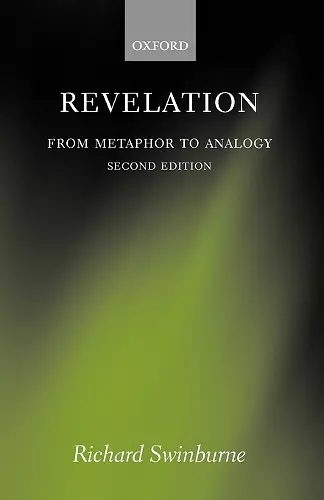Revelation
From Metaphor to Analogy
Format:Paperback
Publisher:Oxford University Press
Published:26th Jul '07
Currently unavailable, and unfortunately no date known when it will be back
This paperback is available in another edition too:
- Hardback£68.00(9780199212460)

The great religions often claim that their books or creeds contain truths revealed by God. How could we know that they do? In the second edition of Revelation, renowned philosopher of religion Richard Swinburne addresses this central question. But since the books of great religions often contain much poetry and parable, Swinburne begins by investigating how eternal truth can be conveyed in unfamiliar genres, by analogy and metaphor, within false presuppositions about science and history. In the final part of the book, Swinburne then applies the results of Parts I and II to assessing the evidence that the teaching of the Christian Church constitutes a revelation from God. In the course of his philosophical exploration, Swinburne considers how the church which Jesus founded is to be identified today and presents a sustained discussion of which passages in the Bible should be understood literally and which should be understood metaphorically. This is a fuller and entirely rewritten second edition of Revelation, the most notable new feature of which is a long chapter examining whether traditional Christian claims about personal morality (divorce, homosexuality, abortion, etc.) can be regarded as revealed truths. A formal appendix shows how the structure of evidence supporting the Christian revelation can be articulated in terms of the probability calculus (and shows that Plantinga's well-known argument from 'dwindling probabilities' against probabilistic arguments of this kind is not cogent).
Review from previous edition This book succeeds very well in mapping the major issues involved in establishing the credibility of central Christian claims about divine revelation. ... In an admirable fashion Swinburne clearly distinguishes revelation from biblical inspiration, highlights the role of the Church in establishing the canon, and insists on the indispensable place of credal and doctrinal texts in biblical interpretation. ... This book would be a first-rate text for graduate (and superior undergraduate) students concerned with major issues of revelation. For that reason alone I was very glad to see it issued simultaneously in hardback and paperback. * Heythrop Journal *
The issue is pursued with the clarity and philosophical precision for which Swinburne's work is rightly renowned ... The case that Swinburne argues is a careful, logical one. * Journal of Theological Studies *
Written to the highest academic standards ... should be included in libraries catering for postgraduate courses in the philosophy of religion. * Theological Book Review *
Swinburne has once again produced an outstanding work in philosophy of religion. * The Philosophical Review *
Historically rich but theologically controversial book. * Faith and Philosophy *
ISBN: 9780199212477
Dimensions: 216mm x 139mm x 22mm
Weight: 535g
384 pages
2nd Revised edition